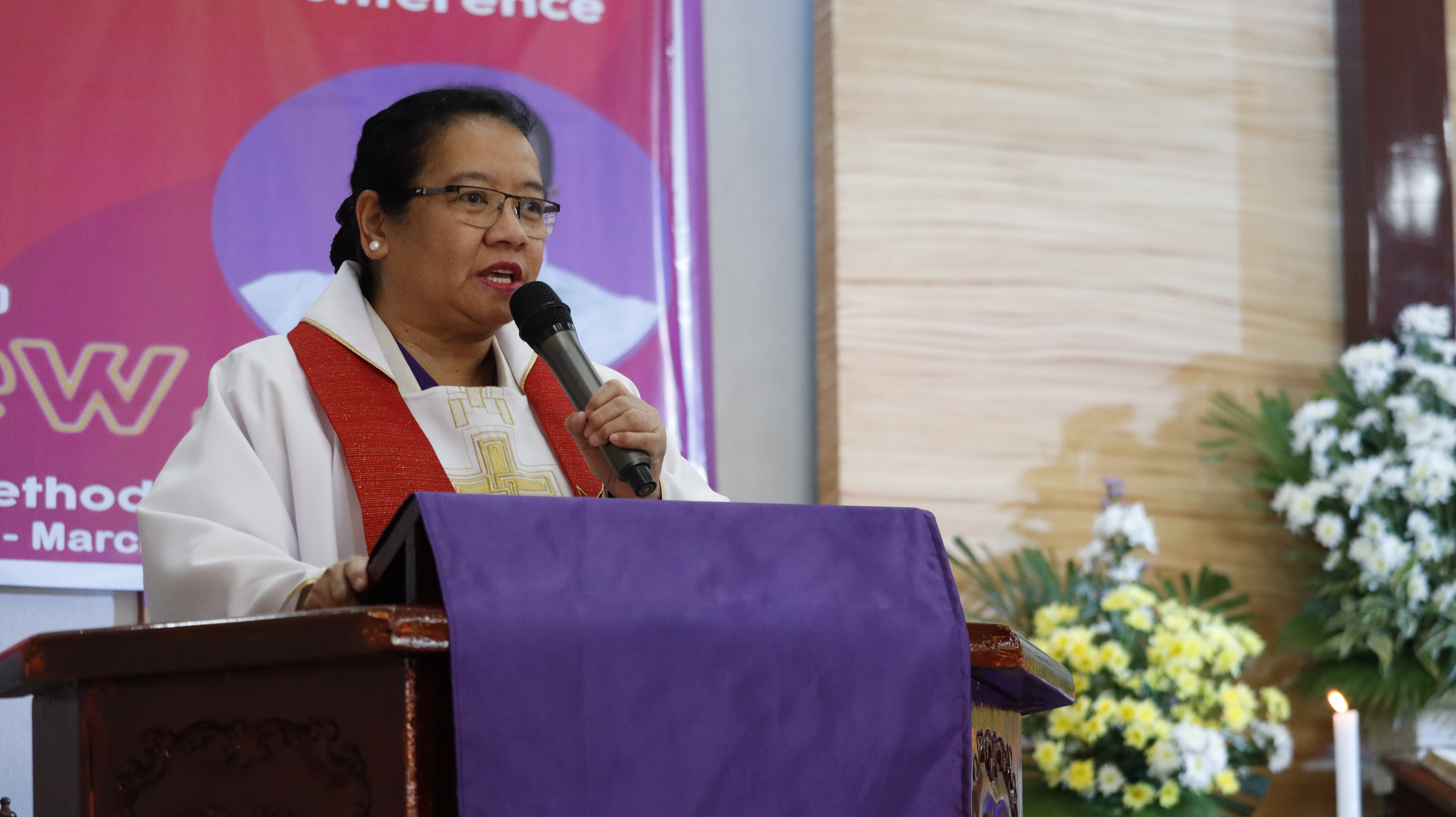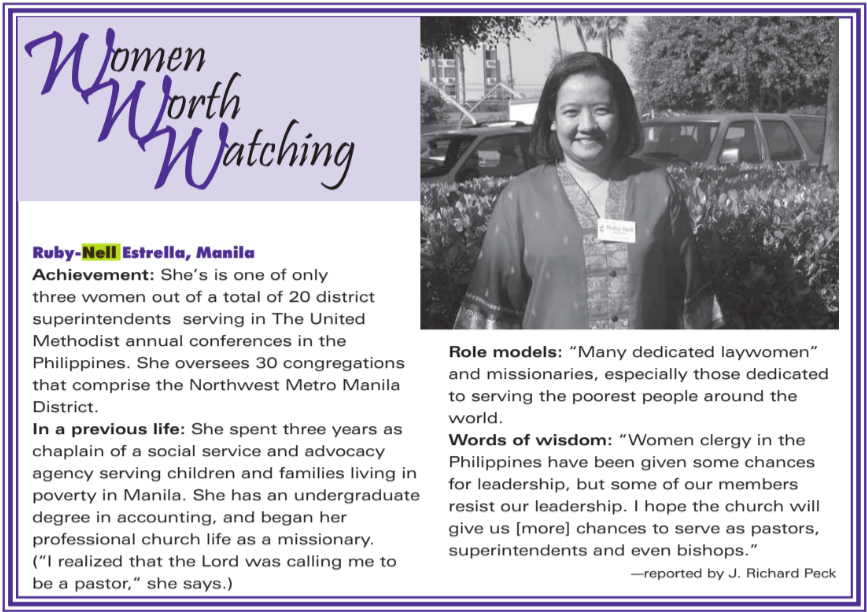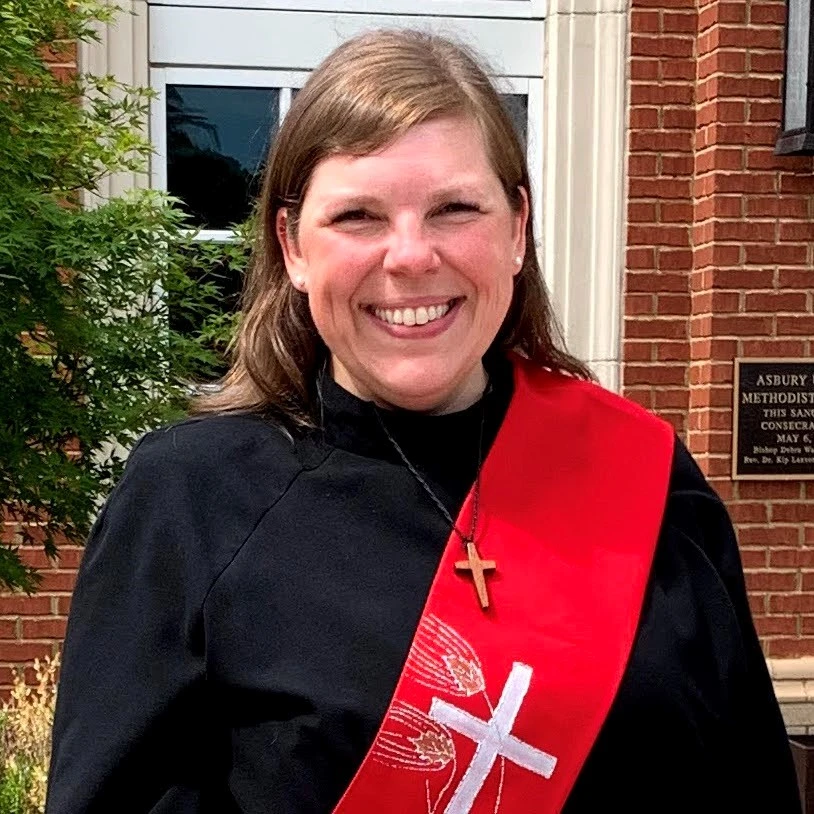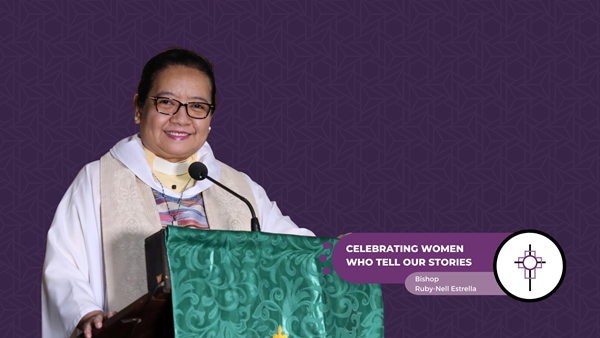When Ruby-Nell Estrella went to college, the last thing on her mind was ministry. She was trained and graduated as an accountant. Yet, she did not love the jobs following her training. She quit and opted to volunteer to serve as the secretary of her local church, and there she “felt the greatest joy.” Serving in the realm of the church suddenly became much more appealing, and Estrella began considering the path toward becoming a deaconess, which is an incredibly active area of church-related lay ministry for women in the Philippines Central Conference, a collective of more than 20 annual and provisional annual conferences. But her pastor – and boss – encouraged her to pursue ordination instead. At the time of her ordination, she was only one of two clergywomen in the Philippines Annual Conference.
 Photo courtesy of United Media Channel.
Photo courtesy of United Media Channel.Estrella emphasized how heavy the journey has been as one of very few clergywomen in her area. Within the Filipino culture, Estrella sensed that there was a priority, or almost an entitlement, of men in leadership. To lead as a woman, Estrella said she had to work even harder to earn the trust and respect of her parishioners. Women leaders in the Philippines Central Conference have to prove themselves. So, Estrella took on the challenge.
She has served as a pastor at local churches and on the Cabinet as a superintendent. While serving on the Cabinet she helped to put the organizational ties together for the first established United Methodist congregation in Dubai, United Arab Emirates. In her annual conference, she was the first woman superintendent. She was the first woman to serve as the lead pastor of Central UMC, the first Protestant church in the Manila area. She was also the first clergywoman elected to serve as treasurer of the Philippines Central Conferences, in which her background in accounting prepared her for six years of service in that role.
From 2005 to 2012, Estrella served on the Connectional Table, where she was appointed to be on the Study Committee on the Worldwide Nature of the Church. She had the honor to be part of the reporting team to the General Conference on the work of the committee. She remembered that as one of her proudest moments as she conveyed the importance of the global nature of the denomination before the body that makes all of the denomination’s major decisions.
 Estrella listed as "Women Worth Watching" for GCSRW's previous newsletter, THE FLYER, April-June, 2005.
Estrella listed as "Women Worth Watching" for GCSRW's previous newsletter, THE FLYER, April-June, 2005.While there might not have been as many clergywomen to help Estrella blaze a path for ministry, she appealed to the strength and influence of the deaconess movement in the Philippines. She noted that they are very empowered women, and that many clergywomen often find their way into ordination through their involvement with the deaconesses. As a young person, Estrella found herself nurtured and supported by the deaconesses. Additionally, the Philippines Central Conference has a Board of Women’s Work that promotes the work of women in United Methodism, so it is typically known how effective women’s ministry is across the Philippines.
The deaconesses and the National United Methodist Women's Society of Christian Service (the Filipino equivalent of the United Women in Faith) essentially drafted Estrella into a campaign for the episcopacy. There was a strong call from Filipino women to elect their first woman bishop in the Philippines Central Conference. While there were three women on the ballots – all supported by the National Clergywomen’s Association, it was a difficult task to push Estrella to the finish line. During the balloting, there was an enormous amount of resistance to electing a woman and the politics of the area were on display. It took 20 ballots for the first woman to be elected to the episcopacy within the Philippines Central Conference.
Estrella spoke to the difficulty of the process of elections, as she tends to not want a microphone to speak to her own abilities or promote herself. However, the women continually supported and carried her through the process, she remembered. She knew she had to present herself differently than the men did in the process, and she still found a way to persuade Filipino Methodists. She leaned into her relationships with people, disavowed using political strategies for votes, tried to be herself. She noted that it is “the office that seeks the person,” and not the other way around. Her open approach to building relationships, her willingness to listen, and her collaborative leadership skills caught the attention of those voting, as she not only received election, but some of her colleagues consider her the “bishop with a heart.”
 Photo courtesy of United Media Channel.
Photo courtesy of United Media Channel.She noted that in ministry, it has always been just a little easier to serve when there were people who welcome women’s leadership. In fact, that atmosphere empowered her. Throughout her ministry she always knew that even if it got tough or she grew tired, the women would support her and carry her. This kind of ministry represented what she hopes to see in the future as an episcopal leader.
Estrella envisions equal representation for women in the Philippines, from training to ministries to other opportunities. She dreams of women empowered, from laity to clergy, and serving in positions of leadership. She imagines a wholistic program that helps women to be equal partners in serving the church, and she is looking forward to the day when there will always be a woman in episcopal leadership in the Philippines Central Conference. That women are seen as equals. This is what she hopes to be the mark of her leadership as a bishop.
To get to this point, there is still significant work to be done, and Estrella is aware of the demands to this work. She admits that there must be work among clergywomen to be more united and to increase their collegiality; clergywomen are stronger together than apart, she notes. She hopes that leaders across The United Methodist Church will be quick to see those potential leaders that may be shy or isolated and work to give them resources to allow them to assert themselves into leadership.
GCSRW celebrates the first woman bishop in the Philippines with the election of Bishop Ruby-Nell Estrella and is thrilled that she joins the Council of Bishops. We pray for Bishop Estrella as she boldly advocates for women’s leadership in the Philippines and across The United Methodist Church, that she will continue to pursue her call and empower all those who surround her.
Related links:
https://www.umnews.org/en/news/estrella-elected-philippines-centrals-first-female-bishop
https://www.nyac.com/newsdetail/17-new-umc-bishops-get-warm-welcome-at-cob-meeting-17181703
https://www.unitedmethodistbishops.org/person-detail/4173269
https://www.facebook.com/UMCTVph/videos/listen-rev-ruby-nell-estrella-pcc-episcopal-candidates-forum/3329467547341958/

Rev. Emily Nelms Chastain is a PhD student at Boston University, where she focuses on 19th and 20th Century American Christian History and the intersectionality of faith and gender. She earned her B.A. in History at the University of Alabama at Birmingham in 2007 and graduated with an M.A. Religion and M.Div. in 2019 from Claremont School of Theology. She's an ordained United Methodist Deacon in the North Alabama Conference, and entered academia after serving for 9 years within the United Methodist Church where she worked in Connectional Ministries. Emily served as a reserve delegate to the 2016 General Conference and as a delegate for the 2016 Southeastern Jurisdictional Conference. She has served on the GCSRW board since 2016.

